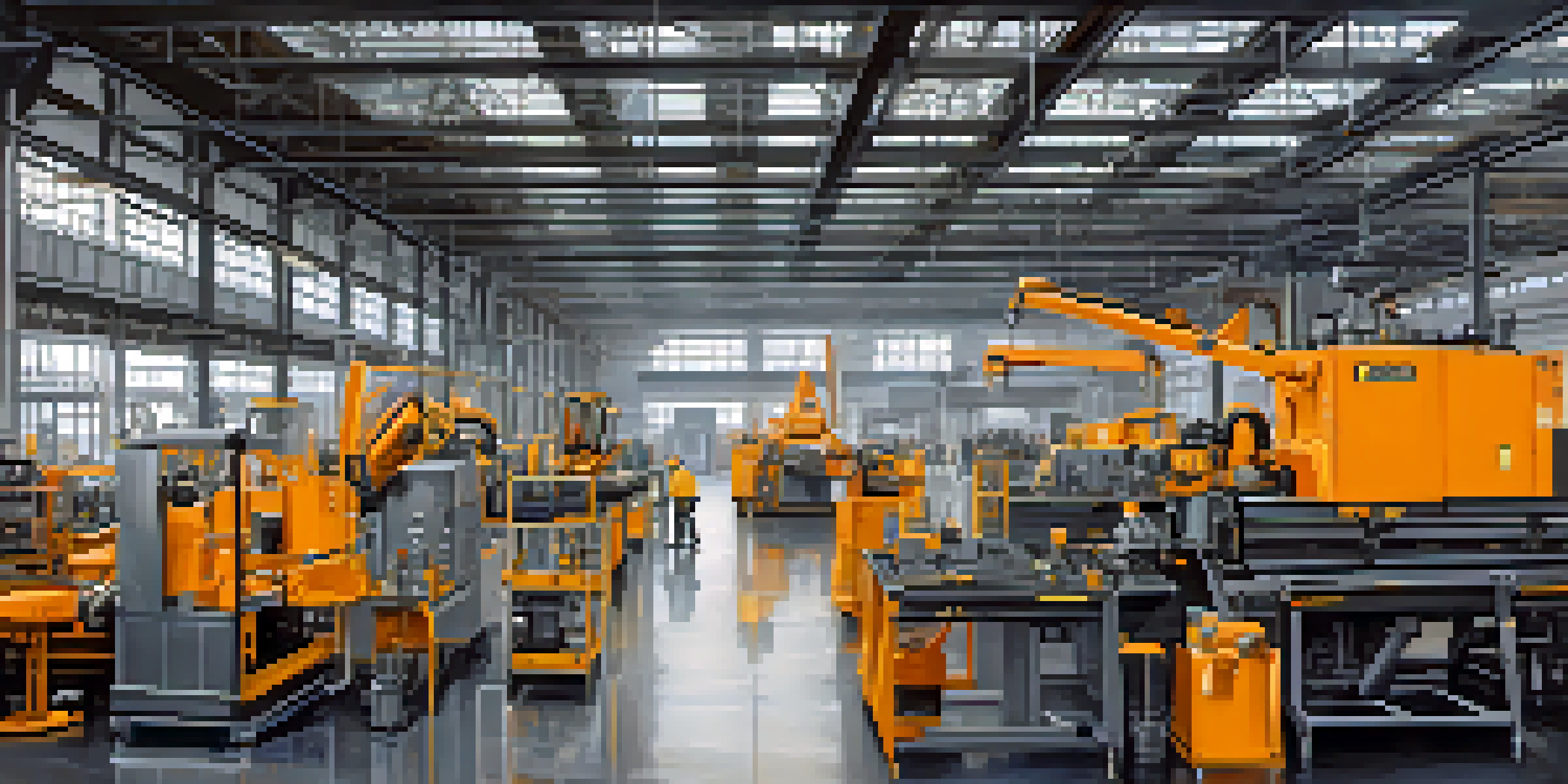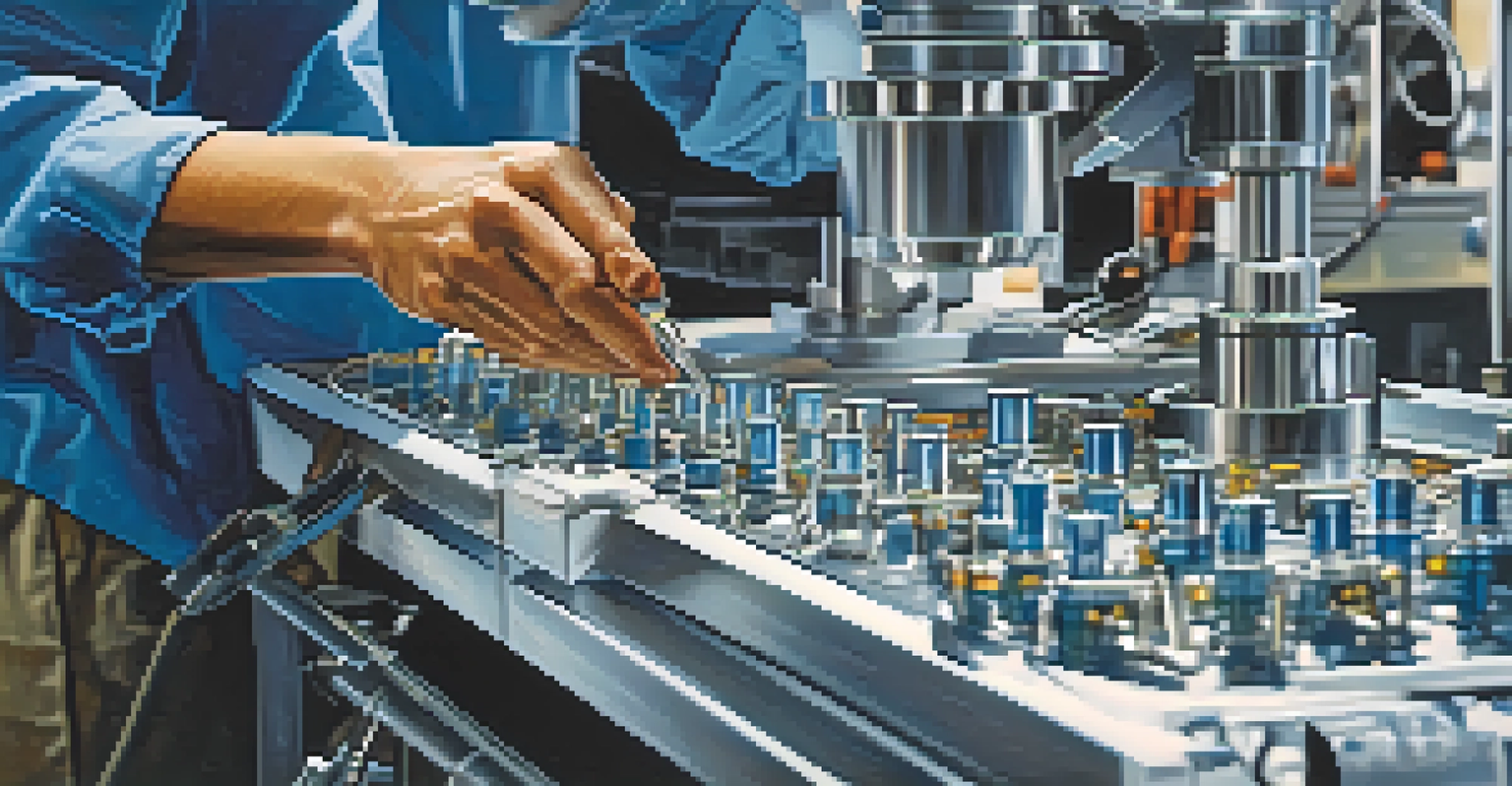The Role of Manufacturing in Pennsylvania's Economic Growth

Understanding Pennsylvania's Manufacturing Landscape
Pennsylvania has a rich manufacturing history, dating back to the Industrial Revolution. This state is known for its diverse manufacturing sectors, including steel, textiles, and machinery. The combination of skilled labor and robust industrial infrastructure has made Pennsylvania a manufacturing powerhouse.
Manufacturing is a key driver of economic growth and innovation in Pennsylvania, providing jobs and fostering local communities.
As of recent statistics, the manufacturing sector employs over 500,000 people in the state, contributing significantly to its economy. With a focus on innovation and technology, many manufacturers are adapting to modern challenges, ensuring they remain competitive. This adaptability is crucial for sustaining growth in a rapidly changing economic landscape.
Manufacturing in Pennsylvania isn't just about numbers; it's about communities. Many towns have flourished around manufacturing hubs, creating jobs and supporting local businesses. The interconnectedness of these industries with local economies highlights the sector's importance beyond mere output.
Key Industries Driving Growth in Pennsylvania
Among the most prominent industries in Pennsylvania, pharmaceuticals and biotechnology stand out. These sectors not only provide high-paying jobs but also attract research investments that propel economic growth. The state has become a leader in health-related manufacturing, particularly in drug production and medical devices.

Another substantial contributor is the food and beverage sector. Pennsylvania is home to a variety of food manufacturers, from artisanal producers to large-scale operations. This diversity ensures that the local economy benefits from both small and large enterprises, creating a stable job market.
Manufacturing Drives Pennsylvania's Economy
The manufacturing sector employs over 500,000 people in Pennsylvania and significantly contributes to the state's economy.
Lastly, advanced manufacturing technologies, including robotics and automation, are reshaping traditional industries. Companies are increasingly integrating these technologies to improve efficiency and quality, reinforcing Pennsylvania’s position in the global market. This shift also requires a skilled workforce, which further drives educational initiatives in the state.
The Economic Ripple Effect of Manufacturing
Manufacturing doesn't just create jobs; it fosters a network of support businesses as well. For every manufacturing job, several related jobs emerge in areas like logistics, supply chain management, and retail. This ripple effect amplifies the economic benefits, contributing to a more stable economy.
The future of manufacturing is not only about production; it's about innovation, sustainability, and collaboration.
Moreover, the spending power of manufacturing employees plays a critical role in local economies. As workers earn wages, they spend money on housing, food, and services, stimulating growth in various sectors. This cycle of spending reinforces the importance of manufacturing beyond its direct contributions.
The presence of manufacturing firms also encourages innovation and entrepreneurship. Local suppliers often emerge to meet the demands of larger manufacturers, creating a dynamic environment for new businesses. This fosters a culture of innovation, which is essential for long-term economic sustainability.
Challenges Facing Pennsylvania's Manufacturing Sector
Despite its strengths, Pennsylvania's manufacturing sector faces significant challenges. One major issue is the shortage of skilled labor, which has been a persistent problem for years. Many manufacturers struggle to find workers with the necessary technical skills, which can hinder growth and productivity.
Additionally, competition from overseas markets poses a threat to local manufacturers. Cheaper labor costs in other countries can make it difficult for Pennsylvania companies to compete on price. This has led some manufacturers to focus on quality and innovation to differentiate themselves in the market.
Innovation Fuels Manufacturing Growth
Investments in research and development, including advanced technologies like 3D printing, are essential for the growth and competitiveness of Pennsylvania's manufacturers.
Moreover, regulatory changes and trade policies can impact the manufacturing landscape. Changes in tariffs or labor laws can create uncertainty, making it challenging for businesses to plan for the future. Navigating these complexities is crucial for maintaining a thriving manufacturing sector.
The Role of Innovation in Manufacturing Growth
Innovation is at the heart of Pennsylvania's manufacturing success. Companies are increasingly investing in research and development to create new products and improve processes. By embracing new technologies, they can enhance productivity and quality, which are vital in a competitive market.
One notable example is the rise of additive manufacturing, or 3D printing, which is transforming how products are made. This technology allows for rapid prototyping and customization, reducing waste and increasing efficiency. Pennsylvania manufacturers are at the forefront of this trend, showcasing the state's commitment to innovation.
Furthermore, collaboration between manufacturers and educational institutions is fostering a culture of innovation. Programs that emphasize STEM education (science, technology, engineering, and mathematics) are preparing the next generation of skilled workers. This partnership is essential for sustaining long-term growth in the manufacturing sector.
Sustainability and Manufacturing in Pennsylvania
Sustainability has become a focal point for many manufacturers in Pennsylvania. As consumers increasingly demand environmentally friendly products, manufacturers are adapting their practices to meet these expectations. This shift not only helps the environment but also opens new market opportunities.
Many companies are investing in renewable energy sources and sustainable materials to reduce their carbon footprint. This commitment to sustainability can enhance their brand reputation and attract eco-conscious consumers. In a state rich with natural resources, Pennsylvania manufacturers have unique opportunities to lead in sustainable practices.
Sustainability Shapes Future Practices
Manufacturers in Pennsylvania are increasingly adopting sustainable practices to meet consumer demand and enhance their brand reputation.
Additionally, sustainability initiatives can yield significant cost savings. By optimizing operations and reducing waste, manufacturers can improve their bottom line. This dual focus on profitability and sustainability is crucial for long-term success in an evolving marketplace.
The Future of Manufacturing in Pennsylvania
Looking ahead, the future of manufacturing in Pennsylvania appears promising. With ongoing investments in technology and workforce development, the state is poised to maintain its manufacturing leadership. The combination of innovation, skilled labor, and a supportive business environment will continue to drive growth.
As global demand for advanced manufacturing rises, Pennsylvania can capitalize on its strengths. By focusing on high-value products and sustainable practices, manufacturers can thrive even in competitive markets. This strategic approach will be essential for adapting to ever-changing consumer preferences.

Moreover, fostering a collaborative ecosystem between government, industry, and educational institutions will be key. By working together, stakeholders can address challenges and seize opportunities, ensuring that Pennsylvania remains a vital player in the manufacturing sector for years to come.